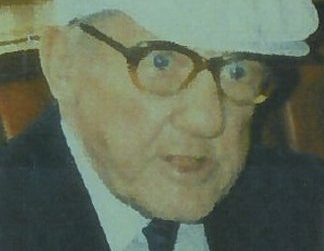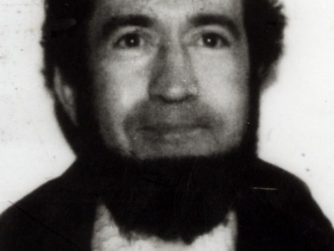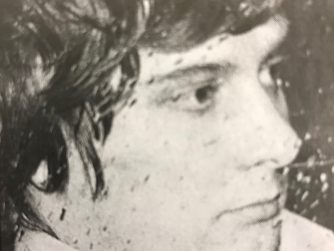
The village of Blacknest, in Hampshire, is a quaint English village the like of which number into the thousands. This tiny Hampshire village, however, has a macabre claim to fame unlike the vast majority of other villages. Blacknest has set the scene for two brutal murders in its history – and both have centered on what is commonplace the hubbub of any small village’s life, the local pub.
Today, there are few patrons of Blacknest’s local pub, the Jolly Farmer, that would ever imagine the role it has played in this dark chapter without reading the immortalisation that both murders have received in a display on the walls. Indeed, TTCE lived in Hampshire many years ago and used to frequent this pub, and had never heard of either case before reading about it in the bar of the pub itself.
In the 19th century, on the site where the Jolly Farmer stands now was once an alehouse named The Cricketers. It was in The Cricketers one night that the landlord, the fantastically named Cyprus Knight, took a shotgun and in a drunken stupor blasted his wife to death. Within hours, Knight was arrested and detained, and following his trial for her murder some time later, was hanged at Winchester Prison.
The Cricketers never recovered from this horrific incident, and was knocked down a couple of years later. A new pub took its place, The Jolly Farmer, but in 1989 this pub was again the scene of a horrific incident.
It was the run up to Christmas and the village was in full preparation, as is every other village around that time. At 2:40am on the morning of Tuesday December 5 1989, a massive explosion shook the village. It was loud enough to have been heard more than two miles away, and residents woken by the blast became rapidly aware that the source of the explosion was The Jolly Farmer.
Locals rushed to the scene to see what they could do to help, and awaited the emergency services, who were there in force inside of 15 minutes after the explosion.
The explosion had been massive, and the pub had been totally destroyed. All that remained was the chimney stack, the outside post-box, and the pub’s sign, albeit scorched and damaged. Christmas presents, furniture and glass lay strewn across the roads where the force of the blast had deposited them, and beer casks, furnishings and bottles were found in neighbouring fields more than 100 yards away.
Afterwards, locals and emergency services described a macabre and chilling scene. In the midst of the rubble and mortar, a moving hand was spotted poking through the wreckage. It belonged to The Jolly Farmer bar manager Richard Dean. Rescuers climbed onto the rubble and pulled him out of the fire, his still burning clothing searing into his flesh. Dean suffered severe burns to more than a quarter of his body and would subsequently suffer mental issues and months of hospital treatment, but was at least alive.
Pub chef Clifford Howes had not been as lucky, however. He was found, almost burned beyond recognition, in the cellar. The 34 year old had died a horrific and agonising death, being burned alive whilst trapped under burning beams and pinned down by heavy flaming masonry.
Initially, the explosion was thought to be a tragic accident. Any number of things could have caused a fire to ignite, and with the amounts of flammable liquid and canisters of pressurised gas that would have been in the pub, an explosion would have been inevitable. However, two discoveries the next morning caused investigators to determine that the fire was started deliberately.
The following morning, when the charred remains of Clifford Howes were discovered, an overpowering smell of petrol was detected in the cellar. Then, it was discovered that the telephone lines to The Jolly Farmer had not been destroyed by the explosion, but had been professionally and deliberately cut. Detectives were dealing with an unbelievably savage and planned crime, and launched a murder enquiry.
Investigators later determined that the fire had been started by the killer, or killers, pouring gallons of petrol down through the wooden doors of the cellar. A homemade wick had then been placed down and ignited, but this had failed to burn down. However, the petrol vapour had still built up in the atmosphere of the confined space of the cellar. A recently installed electric dehumidifier had activated, causing an electric spark which had ignited the petrol vapours and caused the massive explosion.
Former landlord Arthur Thompkins recalled afterwards:
“I had no knowledge of it at all until four or five in the morning, when I got there I was told that one person was in hospital badly injured and another person was missing. They didn’t find Clifford at all and they kept saying that he must have wandered off, and it wasn’t until they excavated right down into the cellar that they found him.
The full force of the blast went straight up through his room and it would appear that everything came down, all the ceiling and masonry, came down on top of him because he was right down at the bottom of the cellar”. – Arthur Thompkins
Clifford Howes had indeed been asleep in his room at the time, and his first floor bedroom had taken the full force of the explosion. It had collapsed right the way down into the cellar, taking Clifford with it and causing him to die horrifically.

What was the motive for this crime? Was the fire personally aimed at either Clifford or Richard as a target, or were they just unfortunate enough to have been in the pub at the time? Was it burned down for monetary gain, perhaps in an attempt to claim an insurance payout? Was it somebody who had perhaps bore a grudge, having been barred from The Jolly Farmer in the past or who had fallen foul of a member of staff? Was it a mistake, and a different pub that was the actual target was missed?
Police examined the backgrounds of both Clifford and Richard to search for any motive that anybody would want for them harmed or killed, but drew a blank. Hampshire police questioned all locals of Blacknest, and customers and staff from The Jolly Farmer, and examined the theories outlined above. All drew a blank, to this day there is simply no motive that police have ever discovered.
They did however, discover as a result of enquiries that a car had been seen speeding away from the pub seconds after the explosion happened. Frustratingly, a make or decent description could not be obtained. A massive appeal was launched, but this and numerous other public appeals have always failed to identify the driver. It is one of the many frustrating points about the case that has never been resolved. Did the killer stay and watch? If not, why has the driver of the mystery car never come forward?
The pub was rebuilt, and 100 days later was reopened, with the tribute to Clifford immortalised on the wall inside. It became a thriving business again, and TTCE always found it a very pleasant place to visit. Arthur Thompkins, the landlord for many years, sold the pub in 2003, and to this day remains convinced that someone bombed The Jolly Farmer because they had got the wrong pub.
“There was absolutely no reason to target us. The police had all these theories for a motive but they found nothing because there was nothing to find. It was just a quaint little pub in the middle of nowhere. Why would anybody target it? It’s ridiculous.
I’d like closure, I’d like to know the answer but it’s a thing in my past now and you have to move on. I’m resigned to the fact that I’ll never know.” – Arthur Thompkins
The case is still open, and is reviewed periodically as funding becomes available and as changes in DNA technology dictate its possibility. A review in 2003, however, failed to generate any new lines of enquiry.
The detective in charge of the original investigation, Chief Superintendent Mike Southwell, is now retired. Yet he still remains haunted and baffled by the case because the killer or killers have not been brought to justice, and the case remains unsolved.
“It’s not closed and there are still things that we need to find out about that case. I am convinced to this day that the murderer is still detectable,” Chief Supt Mike Southwell (retd)
What was the reason behind such a heinous act? With all cases of suspicious fires, those who would benefit from any insurance claims were suspected – but police ruled this out as a motive. The backgrounds of all of the staff who worked at The Jolly Farmer were examined in depth, but nothing or no one was discovered as a result of these enquiries who could be found to bear any grudge or indeed had any motive for wanting anyone killed, or the pub destroyed.
Was it then, a case of mistaken identity? There are 21 pubs around the United Kingdom with the name The Jolly Farmer. At least 7 of these are currently found within the county of Hampshire. There is a very real possibility the killer or killers had simply got the wrong pub- but that still leaves the question of why someone would want a pub burned down anyway? This is a very valid possibility, but after the passage of so much time and with such a wide net to cover all of these, it seems a near impossible task. Perhaps it was the pub itself that was the target, and not either Clifford or Richard. After all, there are more direct, less risky ways to kill somebody you were planning to kill. Burning a premises down, then waiting to see it burn, would provide a risk to the perpetrator themselves. It is TTCE’s opinion that this was in fact the case, and that the murder of Clifford Howes and attempted murder of Richard Dean was a secondary outcome, unintended perhaps? Even if murder was unintended, it was however, a very determined perpetrator. The killer(s) would have had to purchase and transport the petrol, pour it, have pre made a wick and placed it down into the cellar. They would have then had to light it, and watch to ensure their process had been successful. And of course, had cut the telephone lines to ensure that the emergency services would have the biggest delay possible. Somebody wanted The Jolly Farmer gone.

The Jolly Farmer is still open now after its rebuild, and is a thriving business. Without sounding like an advert, it is a very pleasant place to visit. If you ever find yourself in the village of Blacknest in the English county of Hampshire, call in and experience it for yourself. Make sure to take time to read the local press cuttings concerning the 1989 fire, study the charred postbox that was all that remained after the explosion (and is now fixed in a display case with the aforementioned cuttings inside the pub) and take time to remember that the killer who so callously murdered Clifford Howes and who came close to killing Richard Dean has never yet been brought to justice. There may well be a member or members of the public who have the information needed to make a breakthrough in the case, but have not yet come forward. A sense of massive guilt about the crime, or a misguided loyalty or duty to protect someone may be preventing this. Hopefully though, as time passes, loyalties may change and this person or persons may now come forward and provide the information that is so needed. Anyone who has information can relay it to the Northern Major Crime Department at Basingstoke, on 0845 045 4545.
The True Crime Enthusiast.





There was an in depth Crime Month appeal on LWT in1996 buts list to time. The only online video is a short appeal from David Hatcher on bbc crime watch , visible on YouTube.